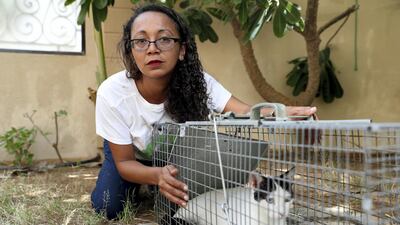At Dh75,000 it won’t come cheap but animal welfare volunteers say the potential purchase of a purpose-built mobile veterinary clinic could be the perfect antidote to Abu Dhabi’s rampant feral cat issue.
Animal Welfare Abu Dhabi is hoping to bring a customised van to the UAE to help volunteer vets with the capital's growing sterilisation programme.
The group has established more than 200 feeding stations but touring each one taking in a few cats at a time to clinics to be treated is a costly and time-consuming operation.
A mobile clinic able to tour each feeding station to sterilise several at a time, without the need to trap and release the animals, is viewed as much cheaper and a less stressful option for the many cats roaming the streets.
It will give control back to the volunteers, who have been fighting a losing battle to try and maintain the nation’s thriving cat population.
South African Naz Findley is a full-time volunteer with Animal Welfare Abu Dhabi and director of operations.
“There is a desperate need for this mobile clinic to help our extensive Trap, Neuter and Release programme,” she said.
“It will cut down on the stress of the animals, and there is a huge problem with an overpopulation of community cats.
“In terms of TNR, the clinic would be on the ground treating problems where they are needed, and the cats can be treated on-site, so it is more efficient, and effective.”
Mrs Findley is looking at the legal requirements of attracting business sponsorship to help fund the clinic and its future operations.
____________________
Read more:
Rescued cat stories for International Cat Day
Stray cats the most common complaint: Dubai Municipality
Neutering project hopes to reduce cat numbers by thousands
____________________
The latest business to join the AWAD feeding programme is New York University Abu Dhabi, in association with SERCO, the facility’s management company. Hotels and malls have already signed up to the scheme.
It has become an attractive option for companies to improve their corporate social responsibility standing.
“People would rather see an organised feed, and see cats are being dealt with in a humane and compassionate way,” Mrs Findley added.
“If it is organised and messy, it can attract rodents. It looks more professional, and adds to their image as a brilliant university.
“The clinic is a mobile, sterile consulting room. The way it has been used in the UK is as a complete facility, so we know it works.
“If we were to try and buy a vehicle and convert it here, it would be a more expensive process, and take more time trying to find out what works.”
AWAD has a team of 11 volunteers willing to give up their time to man the clinic. The operators hope it will also encourage those on a low income who have taken in cats to seek medical treatment for the animals at a reduced rate, as the clinic will travel around and offer cut-price deals for such people.
Briton Dr Susan Aylott has been working with businesses around the capital, signing them up to AWAD’s professional feeding programme of cats. The cats are seen as nuisance in some areas and the programme offers an alternative to private pest controllers, who often round up and dump the cats elsewhere, outside of the city.
“This mobile clinic would be a far better alternative to the current system we have,” she said.
“At our 200 feeding stations we have to trap a handful of cats at a time, with government help, and it is cost prohibitive and time-consuming.
“With this way, we can park up at a feeding station and treat many more animals. We could sterilise 100 of them and then work across the city.”
Cats that have been dumped on Lulu Island in Abu Dhabi have rapidly multiplied, growing by 340 per cent since 2014.
A feeding station has been established on the island, and vets are planning a second temporary field clinic to carry out more sterilisation to help control population growth.
A recent report by the Royal Society for the Prevention of Cruelty to Animals said 92 per cent of females in a colony would need to be sterilised for any programme to be effective.
A mobile clinic could also help AWAD extend its sterilisation programme to Dubai.
“We are hoping to move into Dubai as it has a real problem with stray cats,” added Dr Aylott.
“An audit report for all of our companies involved with the TNR and feeding project is being prepared so we can show how successful it has been up to now.”


